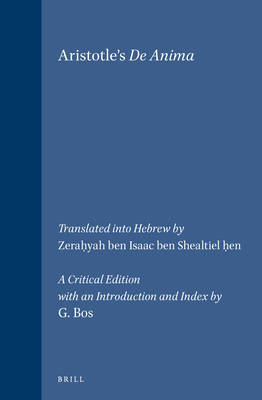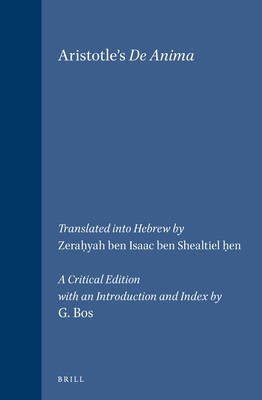
- Afhalen na 1 uur in een winkel met voorraad
- Gratis thuislevering in België vanaf € 30
- Ruim aanbod met 7 miljoen producten
- Afhalen na 1 uur in een winkel met voorraad
- Gratis thuislevering in België vanaf € 30
- Ruim aanbod met 7 miljoen producten
Zoeken
Aristotle's de Anima
€ 328,45
+ 656 punten
Omschrijving
This edition of Zeraḥyah's Hebrew translation of De Anima, Aristotle's monograph on the soul, is of major importance for the history of transmission of Aristotle's text in the Middle Ages. De Anima, commented upon by Greek philosophers such as Alexander of Aphrodisias and Themistius and Arab philosophers such as Avicenna and Averroes, was a major source of inspiration for medieval Arab and Jewish philosophers.
The Hebrew translations of Averroes' commentaries, prepared from 1189 on, were very influential in Jewish intellectual circles. One of the translators involved in this activity was Zeraḥyah ben Isaac ben Shealtiel ḥen, who also translated Aristotle's De Anima. This translation is extremely important since it is based on the same lost Arabic translation as Averroes' long commentary.
The solution which Zeraḥyah's translation provides for the question of the authorship of this lost Arabic translation thus also holds good for Averroes' text.
The Hebrew translations of Averroes' commentaries, prepared from 1189 on, were very influential in Jewish intellectual circles. One of the translators involved in this activity was Zeraḥyah ben Isaac ben Shealtiel ḥen, who also translated Aristotle's De Anima. This translation is extremely important since it is based on the same lost Arabic translation as Averroes' long commentary.
The solution which Zeraḥyah's translation provides for the question of the authorship of this lost Arabic translation thus also holds good for Averroes' text.
Specificaties
Betrokkenen
- Uitgeverij:
Inhoud
- Aantal bladzijden:
- 206
- Taal:
- Engels
- Reeks:
- Reeksnummer:
- nr. 6
Eigenschappen
- Productcode (EAN):
- 9789004099371
- Verschijningsdatum:
- 1/10/1993
- Uitvoering:
- Hardcover
- Formaat:
- Genaaid
- Afmetingen:
- 165 mm x 246 mm
- Gewicht:
- 517 g

Alleen bij Standaard Boekhandel
+ 656 punten op je klantenkaart van Standaard Boekhandel
Beoordelingen
We publiceren alleen reviews die voldoen aan de voorwaarden voor reviews. Bekijk onze voorwaarden voor reviews.







